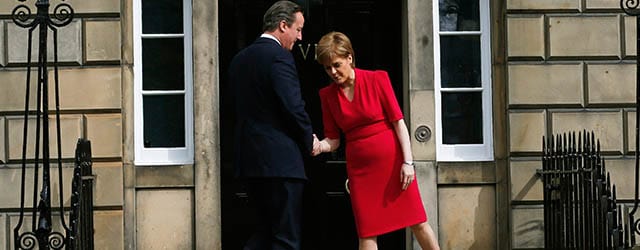Many questions are still being asked about David Cameron’s dramatic win on May 7. How did opinion polls, which predicted a tight race between Conservatives and Labour and even a Labour win, get it so wrong?

Can Labour, after being beaten so soundly and losing all but one of its seats in Scotland, its former heartland, ever govern again? What of the planned referendum on EU membership? What of the centrist Liberal Democrats, reduced to a rump of just eight MPs?
But the biggest question for most people south of the Scottish border is more personal: Just who is Nicola Sturgeon, the leader of the Scottish Nationalist Party (SNP), who led it to take 56 out of Scotland’s 59 seats, against just six in the 2010 election?
Born in a working-class area of Ayr, in western Scotland, Sturgeon, 44, stayed in the shadow of her mentor, Alex Salmond, until he lost last September’s independence referendum. Then she took the reins. Her bright red suit, feisty manner and thick Scottish accent were ubiquitous during the election campaign, as were her calls for a coalition of the left to “lock David Cameron out of Downing Street.” She favors continued EU membership, is opposed to the renewal of the UK’s Trident nuclear system, and is clear on her vision of a socialist Scotland eventually independent of the UK.
Her “success gives her a huge mandate to secure more powers on tax raising and expenditure within a Scotland increasingly devolved from Westminster,” says Charles Lichfield, UK analyst at the Eurasia Group in London.
At her first meeting with Cameron, held on May 15, she secured a mandate to evaluate further devolution following the implementation of proposals that empower Edinburgh to set income tax rates and take some control over VAT. Sturgeon wants autonomy on business taxes and the local minimum wage, as well as more control over welfare spending, and she will make life difficult for Cameron if he doesn’t compromise.
“I don’t anticipate another referendum—yet,” says Lichfield. “However, Sturgeon has identified three triggers that could bring it forward: Britain leaving the EU, a too slow pace of devolution, and excessive cuts to public services. The fact these last two are highly subjective merely reinforces how much leverage she has.”



